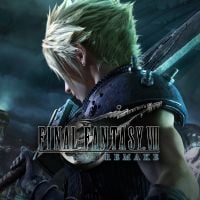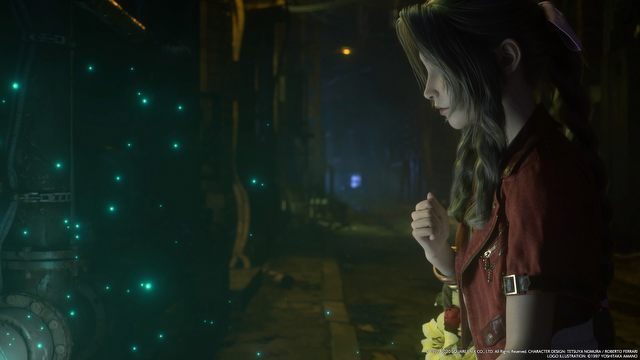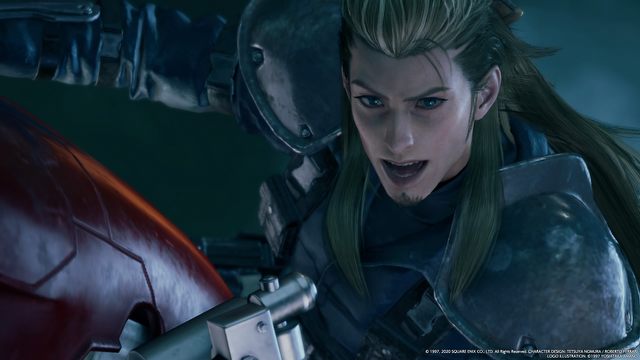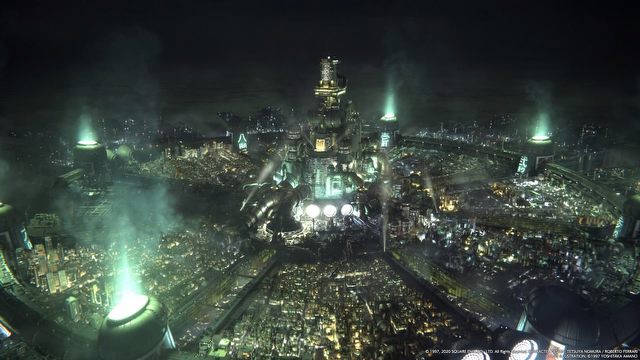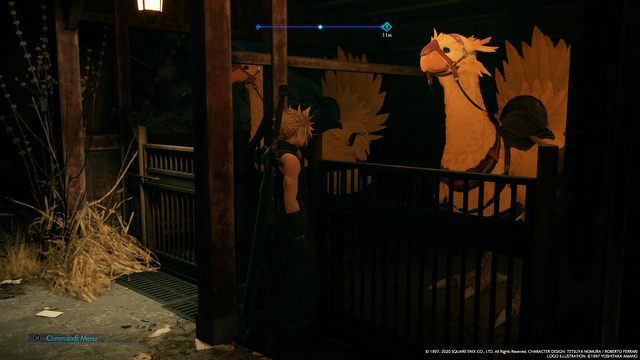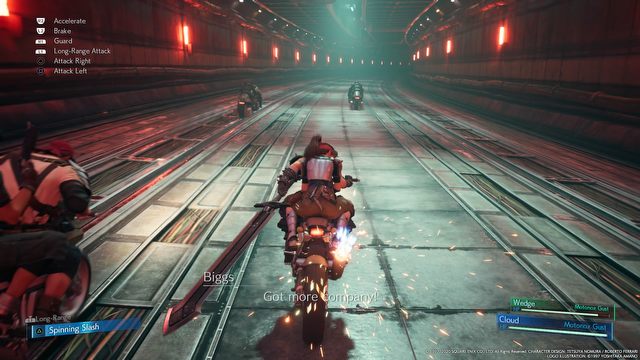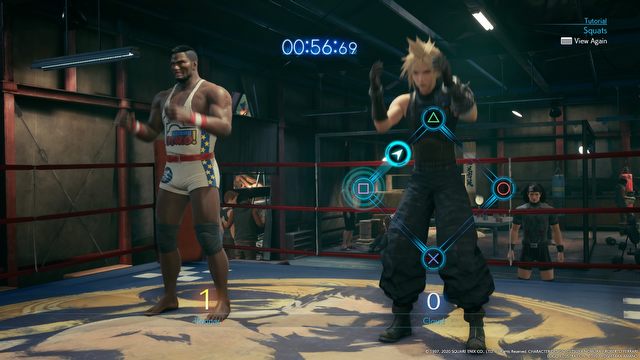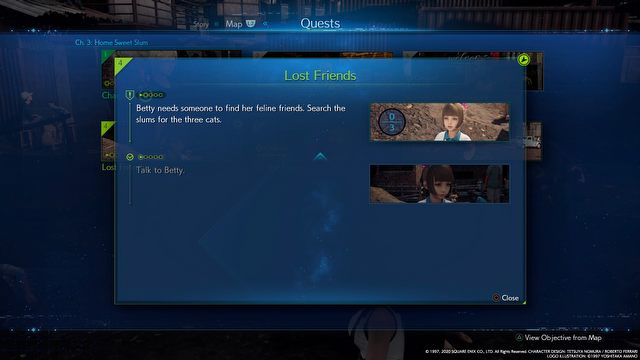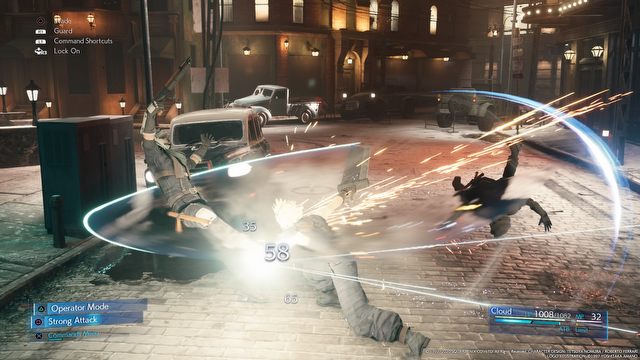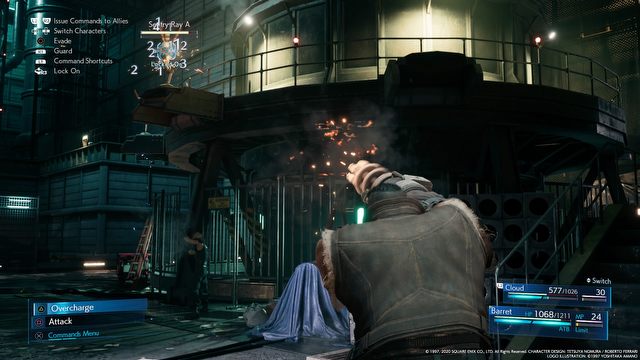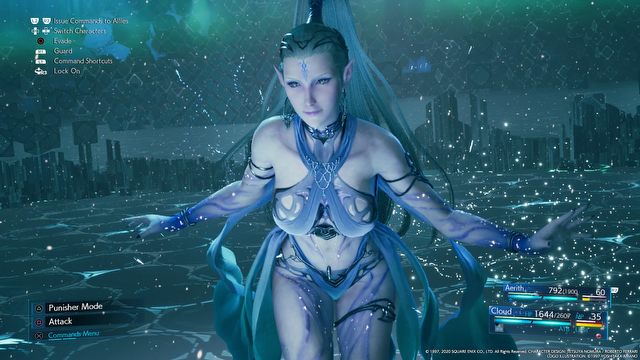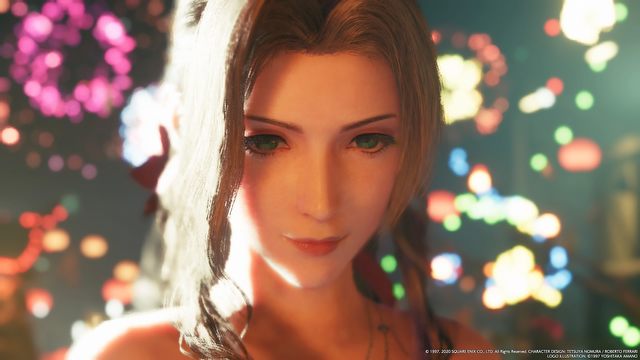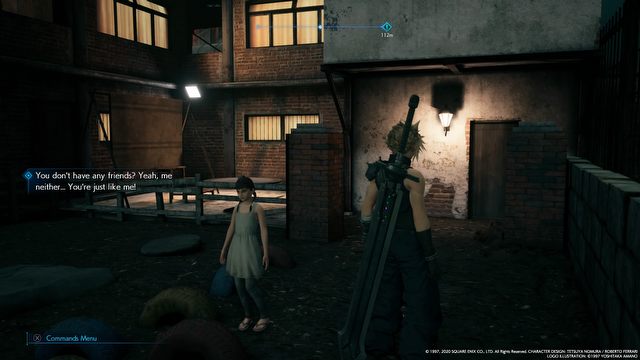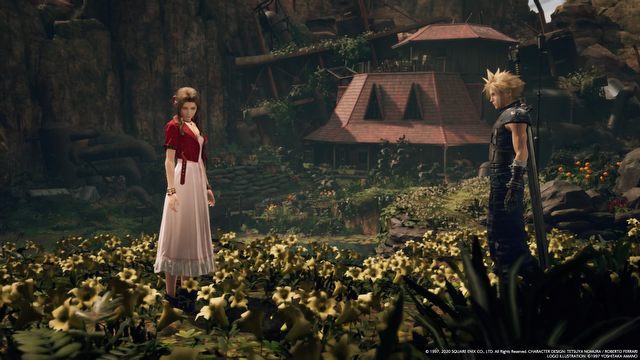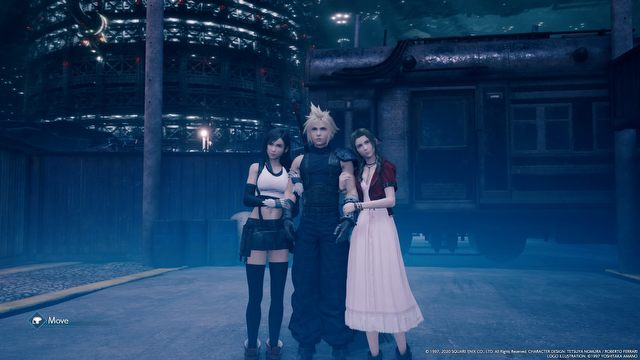Final Fantasy VII Remake – Review of the Most Iconic jRPG Ever
Final Fantasy VII Remake is definitely more than a game calculated to prey on nostalgia. In fact, it's probably Square Enix' bravest game in many years. You don't want to miss this adventure.
The review is based on the PS4 version.

- Honey Bee Inn is a crazy place you're not ready for;
- very bold plot twists;
- a lot of new threads develop an already great story in an interesting way;
- a lot of fun, diverse minigames;
- despite a few shortcomings – solid combat system;
- interesting character development;
- the visual setting can be phenomenal…
- ...but it is very uneven, at times looking poorly.
- some of the new additions to story are boring fillers that break the pacing and artificially increase play time;
- side quests are extremely weak.
Remakes of games can be done in two ways. The first is simply re-creating the old game. Using the advantages of modern technology, graphic and physical engines to faithfully transfer classic storylines, characters and locations into the modern era. In such cases, you try not to interfere with the mechanics, at most improving the crudest of the original solutions, and introducing minor enhancements. These resonate with the original fan-base, but usually fail at reaching broader audience. The new Shadow of the Colossus, Crash Bandicoot N. Sane Trilogy and MediEvil appealed to those raised on their original versions, but the reception among new players (whom they generally failed to attract) was more polarized.
The second approach is to take off the gloves and let yourself go crazy. Turning the original gameplay upside down, adding completely new chapters to the story – making a completely new game. A big risk that will always provoke resistance among nostalgic veterans. But, as Capcom proved with the remakes Resident Evil 2 and, to a slightly lesser extent, Resident Evil 3 – it's also a chance to give the game a whole new life. Attracting not only old fans but also drawing a whole new generation of players.
Final Fantasy VII Remake is definitely aiming for the latter choice. The changes in the combat mechanics that seemed to be the focal point of the discussions of fans before the release, are merely the tip of the iceberg. It's the abundant news stories and threads that are the real surprise. The original script of FFVII is merely a faint outline of the new story. It's a shame that while some of the novelties make the story genuinely better, others are mere fillers designed solely to artificially prolong the playing time.
FINAL FANTASY VII REMAKE IN A NUTSHELL:
- Another game in Final Fantasy VII universe, which we first got to know in arguably the most important jRPG game of all time;
- A Japanese role-playing game with a dynamic combat system;
- An immersive adventure, filled with a huge amount of novelty relative to the original – not all of which, unfortunately, have been well-conceived;
- Even though we only get a part of the original story, the entire adventure takes about 30-40 hours.
Final Fantasy VII Rebuild
Even before the release of Final Fantasy VII Remake, I was concerned about the fact that we're not getting the entire game – only the first location, which originally took a few hours to finish. Having played it now, I can assure you that it was a good, well-executed choice. First, because Square Enix really wasn't exaggerating when they said that remastering the entire game the way they wanted to would simply be impossible; the scale, ambition and scope of the project are really impressive.
This choice also makes sense for plot reasons. The beans were largely spilled by the release trailer (I was really taken aback to see it), but I will still try to explain things without any spoilers. The new threads in Final Fantasy VII Remake go beyond simply expanding the original story. Square Enix has shown some serious cojones here, and I have no doubt that there will be rupture in the community. The game may as well be regarded not as a remake, but as another, alongside Advent Children or Crisis Core part of the FFVII universe.
Before the revolution, however, there is a lot of nostalgia. The intro is a little modified, but contains the iconic fragments, and throws us right in the middle of action. As a minor mercenary, Cloud helps a group of eco-terrorists blow up a reactor that takes the planet's life energy and uses it to power the giant city of Midgar. The dangerous mission puts Cloud on a collision course with the powerful and greedy Shinra Corporation, and allows us to meet his colourful companions – the sympathetic florist Aerith, and Avalanche members: Barrett, Tifa, Wedge, Jessie and Biggs.
For most of the time, the plot recreates events from the original Final Fantasy VII, expanding them significantly here and there. Many of these changes come out nicely – the dialogs, already well-written in the original, are even more funny and natural, and Wedge, Jessie and Biggs, who were rather minor characters, have become fully fleshed-out heroes. What the creators are giving players in Honey Bee Inn is absolute madness, which I wasn't prepared for despite having played five different Yakuza installments. Some of the new threads don't reach a definitive conclusion, but it's rather understandable that the creators decided to leave some loose ends for another game.
Unfortunately, the innovations are a hit-and-miss. I understand that taking a small fragment of a jRPG and blowing it out to reach 40 hours will unavoidably entail some redundant and repetitive content, but Final Fantasy VII Remake seems just hollow at times. I can swallow poor side quests, but when in the middle of the main story, at a rather important moment, the game suddenly makes me chase after a rat-like thief for an hour, I tend to think something's wrong. Another time, we're fighting a super-important enemy, only to be suddenly thrown into a two-hour environmental puzzle. Tempo narracji, zwlaszcza w rozdzialach poprzedzajacych scisly final, bywa bardzo zle rozlozone.
Still, the story is overall definitely good. And, contrary to some concerns, it offers a pretty satisfying finale – you can see its part of a larger whole and there's more to come, but you leave satisfied. The main characters are well defined and the gradual building of relationships between them is presented in a very believable way; the new threads – the substantial ones, at least – are excellent value added to the story, and the moments that are supposed to evoke emotions, do so, even if we know the story. They work like hell.
Final Fantasy XIII Remake
The game is divided into eighteen chapters. All in all, it will take 30-40 hours to complete them, with completionists looking at additional 15 hours perhaps. Think the gap is big? Well, the creators have created a lot of diversions. Many chapters have a fairly simple, corridor-like structure that can evoke associations with the infamous Final Fantasy XIII. We go from point A to B, fighting monsters along the way, every once in a while meeting a small leg leading to a treasure or a simple environmental puzzle. Some of these corridor locations have a rather complex layout and quite skillfully hide their linear structure underneath a multitude of turns, forks, and dead ends.
Every once in a while we also go to more open hubs. There, we can let go of the main thread for a while and focus on activities and side tasks. The former are often amusing mini-games known from the original (though obviously greatly improved); doing squats in the gym, fighting in the Coliseum or playing darts. As for side quests, they're absolutely the worst thing we'll find in Final Fantasy VII Remake.
I admit I haven't completed all the side quests available in the game. I simply didn't have the willpower, since many of these are the absolute worst kind of side quests RPGs can give you. Most of the challenges boil down to "go there, kill that monster, and claim reward." If anything more ambitious comes along, it usually involves frantic running around the location in search of certain objects that are not marked on the map. It's terrible. If these missions at least had some fun plot twists or whatever. But no – we have some unrefined challenges that have us chasing rats, stray dogs, and cats for little girls.
These are all optional challenges, so of course you can just give them up, but then you also give up the extra experience points and make the main thread more difficult – so there's still minimal incentive to engage. You can definitely see that this aspect of the game hasn't been taken very seriously, and it is just one more way of artificially inflating the game.
The undeniable strength of the side quests lies in the fact there's really not that many of them – most locations are corridors that are quite fun to explore. They're also quite varied – mini games are not just available in hubs, but are also part of the main story, and most of them provide a nice diversion.
Limit break
Final Fantasy VII – both old and new – is, of course, mainly about combat. This element caused some initial concern, since it was brought from the semi-turn-based system to a rather dynamical one. A nod to the fans of the original is the classic fighting mode, but I can assure you it's not worth missing on the new one. The classic mode doesn't change the interface at all, its main difference being the fact that when we're idling, the active character is controlled by the AI; on top of that, it sets the difficulty of enemies to low. It's more of an autopilot than a substitute for the actual classic system.
The new system fares very well, despite some questionable solutions. Our team consists of one to three characters, and we can freely switch between them. Each of them plays differently. The sword-wielding Cloud has two fighting styles available and inflicts the most damage. Tifa is a hand-to-hand specialist, and can stun enemies quickly. Barrett, with his machine gun prosthesis, excels at ranged combat, and Aerith specializes in magic.
Everyone has access to a variety of special skills, and they can also use some spells. There are also the classic summons, though it's only available in the toughest fights. It is possible to use items, limit breaks – if I remember correct, virtually all tactical capabilities from the original game are back, expanded with the ability to stun enemies, known from other "Finals."
Combat looks like in your regular action game – we run around enemies, attack, parry, and dodge. In the meantime, we charge the special ATB bar, which allows us to drastically slow time down for a moment – giving more room to cast enchantments, use items, or unique abilities.
The level of difficulty of the duels was quite well balanced, too. Playing on normal, I found myself using Phoenix Downs (for resurrecting team members) quite often, and even regular enemies posed a challenge if I got sloppy. At the same time, it was never too difficult – I dealt with every threat before it got frustrating.
The difficulty of combat, however, is partly due to the incompetence of our team. Our allies in battles are hopeless, and the game gives them a handicap. They're practically not using any special abilities and spells (even getting them to heal the main character in critical situations requires putting a special matter into their inventory, otherwise they won't do it), they're attacks are without conviction, and the enemies are mostly focused on us. I don't understand that approach, and I don't like it – Kingdom Hearts III got it way better. Fortunately, this is a minor inconvenience rather than something that spoils the entire combat system.
Material goods
The fights are cool and all, what's more noteworthy are the systems hiding underneath – and this game has some interesting character development ideas. Subsequent experience levels automatically develop the stats of our characters, we have no influence on that. Instead, we can manually amplify them in other ways.
Take a gun, for example. Each of the tools we use offers unique development trees (or spheres), on which we can choose what bonuses we want – be it an attack and life points bonus, or an extra slot for matters. If we don't want to tamper with it, we can also order the game to automatically manage those points. Each weapon also has a special skill attached to it, which, if we use it enough times, we can learn permanently, being able to use it with any other weapon. An elegant way to encourage players to test a new weapon instead of hanging on to one of their favorites for the entire game.
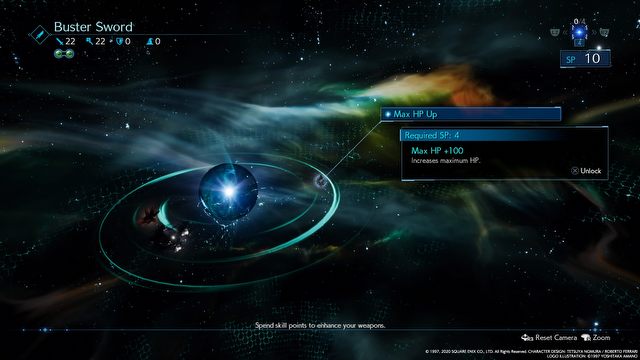
The character development is automated, but we can strongly influence the statistics with the weapons we use.
The game also has plenty of matters – the magical orbs we collect and modify our weapons with. There are dozens of these and they have a wide variety of properties – some give access to certain spells and skills, and others raise base stats or give specific bonuses. The matters have their own experience points, and once certain thresholds are reached, they give access to more powerful spells or give better bonuses. Choosing those that will be the most beneficiary can really increase our chances in battle, and digging into the details of the system can be very enjoyable.
Final Fantasy VII Remade
Visually, FFVII Remake is truly impressive. Perfectly directed cut-scenes, phenomenal effects of spells, the locations which we had to largely imagine in the past, now beautifully recreated in full 3D– it is really easy to lose yourself in this magic.
However, not all virtual elements of Midgar were treated with the same attention to details. The NPCs in hubs look pretty dull, especially when compared to main characters. Textures are often missing, only loading after a brief while. And even if they do load, they don't always look that well. So, visually, it's very uneven – the amplitude is huge, and the game can be as beautiful in the moments significant to story, as it can be ugly at times, when the effort was obviously smaller.
I was also worried that since the entire game was to take place only in Midgar, there would be a problem with small visual variety, but surprisingly, Square Enix managed to cope with that. While the game is dominated by industrial sights, Midgar turns out quite diverse in visual terms – the wasteland-like slums, the green surroundings of Aerith's house, and the residential areas make sure we don't get bored.
The musical setting consists mostly of slightly refreshed classical tunes that fantastically play on nostalgia. But there are also some more extravagant compositions. I liked the new tracks, but I know one person who found these experiments unbearable, and completely silenced the music, so...
I'm just not convinced that the decision to have the extra tracks as collectibles was a good idea. Traveling the world, we can collect music themes that would only be heard later in the original game – like the Gold Saucer, or Cait Sitha themes. A nice trophy, but in my case, it was a rather unpleasant reminder of what we are missing here.
The pilgrimage begins
After thoroughly analyzing the game, I was a little surprised at how much criticism I have for it. This may distort the overall verdict – which says that Final Fantasy VII Remake, despite some flaws, is an exceptional production. An absolute must-have for anyone who fell in love with the original, and a game that's definitely worth checking out for anyone who likes all things Japanese. A title with an engaging story, moments of dazzling visuals, and enjoyable mechanics.
Yes, the pace is sometimes not right. Yes, there are minor shortcomings in the visuals and gameplay. But Final Fantasy VII Remake is definitely more than a game calculated to prey on nostalgia. In fact, it's probably Square Enix' bravest game in many years. You don't want to miss this adventure.
ABOUT THE AUTHOR
I only completed the original Final Fantasy VII at my third attempt. The first two times, I'd ended at about 20 hours into the game. It wasn't until approach number three, on PSP, that the game hit the sweet spot – grinding in my bed before sleep was the proper way of experiencing jRPG for me. It took me 35 hours to complete the Remake, but I skipped many side quests – if I hadn't the game would could have taken even about 50 hours, or more.
Final Fantasy VII Remake
Final Fantasy VII Remake – Review of the Most Iconic jRPG Ever
Final Fantasy VII Remake is definitely more than a game calculated to prey on nostalgia. In fact, it's probably Square Enix' bravest game in many years. You don't want to miss this adventure.
